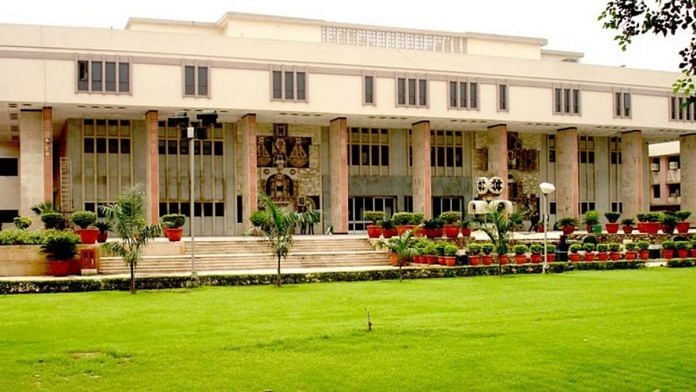New Delhi: The Delhi High Court has overturned the rustication of a Jawaharlal Nehru University (JNU) student on procedural grounds, but also warned that educational institutes could not be converted into political platforms.
Though the court held that disruptive activities by students needed to be sternly dealt with, it quashed the rustication order by JNU because the institution had failed to adhere to protocols provided in its statute.
The court said universities must also adhere to proper legal procedure, as it could lead to students going unpunished, which in turn would encourage their disruptive behaviour.
Justice Hari Shankar was hearing a plea by doctoral student Swati Singh, who was rusticated for two semesters on charges of manhandling a security officer.
Singh was involved in a scuffle with the security last August at a university event welcoming new students. She apparently objected to the guards allowing students from the Akhil Bharatiya Vidyarthi Parishad (ABVP) to take centrestage, while denying entry to others.
Justice Shankar noted that “educational campuses cannot, particularly, be allowed to be converted into political platforms, to propagate party politics”.
The court said discipline was of utmost importance in an educational institution, and political activities could not be undertaken at the cost of the primary function of providing education to the future generation of leaders.
“Disruptive activities by students have, therefore, to be sternly dealt with, and there is no room, whatsoever, for sympathy in such cases,” it added.
However, the court observed that the university’s failure to stick to protocol for the punitive action had led to Singh’s challenge in court.
Quashing the rustication, Justice Shankar noted that this was one of the several cases he decided in the recent past where disciplinary action was set aside owing to non-adherence to protocol.
The rustication and Singh’s challenge
JNU had issued a rustication order to Singh under the university’s statute in response to her alleged manhandling of the security officer.
Singh alleged the institution did not adhere to critical requirements and procedures, including providing her with a copy of the security guard’s complaint and a copy of the video clips used as evidence.
The Chief Proctor had called Singh thrice to explain the action, but each time she expressed her inability to appear owing to her health or her absence from Delhi. JNU then issued a show-cause notice asking her why action should not be taken for misbehaviour.
Singh, once again, expressed her inability to appear before the committee at the provided date, but said she was willing to examine and cross-examine witnesses against her. She reiterated her request for the evidence against her, including CCTV clips.
However, the university did not consider the request and issued a notice in November 2023, rusticating her for two semesters and making her “out of bounds” from campus.
Singh then appealed to the vice-chancellor, saying she had not been given the evidence against her nor allowed to cross-examine complainants. The university, however, did not set aside her rustication order. Singh then approached the Delhi High Court against the university’s action.
The student said the rustication was a clear violation of “principles of natural justice” and Statute 32(5) of the JNU Statute, which details the norms and guidelines to be followed in such an inquiry. The order did not address the defence put up by her and was completely unreasoned, she said.
On the other hand, JNU submitted that the statute was followed in “letter and spirit”. It contended that Singh was called multiple times for the inquiry and, in her response, had as much as accepted the incident.
The court said that Statute 32(5) prescribed a minimum procedure that was “consciously prescribed as the envisaged minimum for compliance with the principles of natural justice and fair play”.
The judge also said that when a law prescribed that something be done in a specified manner, it must only be done in that prescribed manner. “It is clear, from the facts, that the JNU has acted in breach of the procedure prescribed in Statute 32(5).”
It held there had been multiple lapses in the prescribed procedure, including recording the complainant’s statement, supplying a copy of such a statement to Singh, and supplying audio and video clips relating to the incident.
The court also said since video clips were relied upon by JNU to come to a decision, a copy should have been given to Singh, so that its veracity could be checked. These were not done, it noted.
The HC further said the statute required a reasoned decision to be made against Singh, and that orders passed by the university were “completely unreasoned”. The university had also failed in its obligation to supply all material against her for Singh to put up an effective defence, it added.
(Edited by Tikli Basu)
Also read: NCR’s Shiv Nadar school wades into ‘woke’ territory. Adds non-binary gender option in forms



